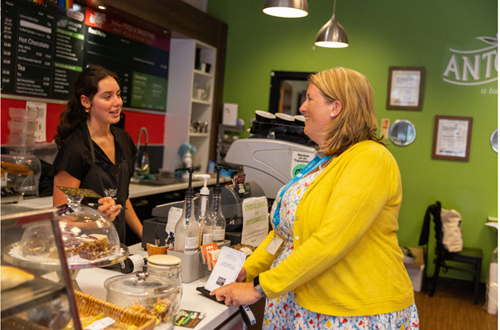Apprenticeships
Content

East Devon District Council is proud to be an Apprenticeship Ambassador, offering a range of apprenticeships across our service areas.
All of our apprenticeships are advertised on our latest vacancies page.

How apprenticeships work
Apprenticeships allow you to combine work and education by mixing on the job training with study for a recognised qualification.
There is no age limit to being an apprentice. You may be a:
- School leaver
- University graduate
- Someone who has worked for a number of years who may want to change career
- Existing employee who wants to gain a qualification in their current field of work
As an apprentice, you will be employed by East Devon District Council on an apprenticeship contract and you will undertake a programme of study alongside working. You will be entitled to 20% off-the-job learning to attend lectures, writing up assignments, shadowing, or attending meetings which facilitate learning.
During your apprenticeship you will gain skills and knowledge relevant to the sector and these will help you to succeed in your chosen career.
You’ll be part of a team and will undertake real work like any other employee but you will have more support and will be learning from experienced professionals.
Depending on the apprenticeship type and the education provider, off-the-job learning may involve attending college one day a week or in blocks. Learning will also take the form of e-learning, webinars, or onsite classes.
You will also be assigned a work place mentor/buddy and an academic mentor, both of whom will provide help and support during your apprenticeship.
The length of the apprenticeship contract will usually be the estimated time taken to complete the level of qualification you are enrolled on.
What do our apprentices have to say about their apprenticeship experience?
Molly's story
Molly, HR Support Apprentice
An apprenticeship is a whole new style of learning and is a fabulous way to get away from a school/college environment. It is a way to get your foot in the door and can lead on to many opportunities that you would never get a chance to experience if you went to college or school.
Doing an apprenticeship at East Devon District Council has showed me so many things that I never would see if I chose to stay at college. Everyone here is kind and are always happy to help where they can. The Council environment is brilliant and makes you feel welcome.
Jacob, Legal Apprentice
Gemma's apprenticeship story

"I moved to Devon with my young family, for a better work life balance after working in finance for over fifteen years. I started working for EDDC as a temporary Business Support Officer in Building Control, it was a job that was meant to be a temporary stop gap, whilst my children were at school. As the assignment was coming to an end another job role became available and I ended up working in our Planning Department."
"From Planning, I moved into Environmental Health. I liked the variety in my new role and loved working with the team. As my experience and confidence grew, I often looked to resolve issues with the guidance of the Technical Officers, by giving advice and answers at the first point of contact. I was then lucky enough to become a permanent member of the business support team."
"When the opportunity arose, I was successful in obtaining a Technical Officer role. Alongside my new role, I was accepted onto the ‘Environmental Health Professional Apprenticeship’."
"This course is four years long but runs alongside my full-time role. The level of additional work has been challenging, and as a mature student it has been difficult to find the time to study alongside busy family life."
"Now in my third year of study, I can finally see light at the end of the tunnel. And the reality of becoming an Environmental health Officer is now within reach."
"Although I achieved my role as technical officer, prior to becoming an apprentice, the apprenticeship is helping me to understand what my long-term aspirations/speciality is likely to be in the future."
"Once I have my qualification, I have the opportunity to specialise in a number of Environmental Health areas. Currently I work in Environmental Protection, but could move into Private Sector Housing, Food Safety and Standards, Health and Safety or specialise in Public Health."
"My current role is varied and interesting, one day I could be investigating noise nuisance complaints and the next I could be searching an empty property in relation to a public health funeral."
"Public Health Funerals are one of the saddest; but rewarding parts of my job. When a person dies, with seemingly no family and sometimes no funds to pay for a funeral, it falls to the Local Authority to search for next of kin and organise the funeral."
"My proudest achievement so far, whilst working for EDDC was the Public Health Funeral Review. As a result, the service we provide to individuals and their families has both improved for them and the authority."
"The service is now more efficient and enables any living relatives to be identified and contacted at a far earlier stage, often with the opportunity for them to attend the funeral and say goodbye to loved ones they may have lost touch with."
"Next steps for me include, working with other teams to gain more experience. I will also be working towards completing my Environmental Health Practitioner (EHP) Portfolio with the Chartered Institute for Environmental Health (CIEH). The portfolio allows me to evidence key learnings and evaluate and reflect on the experiences. This will account for my learning experiences and prepare me for my professional discussion with the CIEH."
"On successful completion of my degree, the portfolio and the professional discussion, I will be eligible to join the EHP Professional Register and apply for a role as an Environmental Health Officer."
"If you get the opportunity to do an apprenticeship with EDDC, grab the opportunity with both hands. The on the job experience you gain with employer-based learning, is far greater than just sitting in a classroom and you get to work in a beautiful part of the country with fantastic people!"
Gemma Bailey, Environmental Protection – Technical Officer, Environmental Health, 31 January 2024
How much will you earn as an apprentice?
As a rule, you will be paid for 37 hours per week.
Apprentices are paid from the first day of their apprenticeship. East Devon District Council has aligned pay for apprentices with the Council’s grading structure and typical apprentice pay will be 90% of the starting salary for that role.
Other benefits
As an apprentice with East Devon District Council, you will also receive 25 days paid holiday as well as public holidays, 2 extra statutory days and one locally agreed day. We also offer you a number of other benefits which are difficult to match in the private sector.
Apprenticeships we have offered
We have provided a range of apprenticeships in the last few years in the following service areas:
- Electoral Registration
- Legal
- Human Resources
- Communications
- Finance
- Revenues and Benefits
- Housing
- Arborist
- Horticulture
- Planning
Levels of apprenticeship available
There are 6 different levels of apprenticeship:
- Level 2 / Intermediate - equivalent to five good GCSE Passes and provide a foundation of practical skills and knowledge. These apprenticeships typically last for a minimum of 12 months and cover a wide range of industries
- Level 3 / Advanced - equivalent to 2 A-Level passes and offer more in-depth training and knowledge. The duration of an advanced apprenticeship is usually between 18 to 24 months, depending on the industry
- Level 4 / Higher - equivalent to HNC, CertHE, Level 4 NVQ , BTEC or first year of University. Higher Apprenticeships are designed for individuals who want to pursue a more specialised career path. They are equivalent to a foundation degree and provide a higher level of training and education. These apprenticeships can take anywhere from 18 months to 5 years to complete.
- Level 5/ Higher - equivalent to DIPHE, HND, Level 5 NVQ, Level 5 BTEC, Foundation degree or second year of University
- Level 6 / Higher - equivalent to BA or BSC degree, Graduate certificate, Level 7 NVQ or BTEC
- Level 7/ Higher - equivalent to Meng, MA, Msc, Level 7 NVQ, PGCE or postgraduate Certificate. Degree Apprenticeships are the highest level of apprenticeships available in the UK. They offer the opportunity to earn a full bachelor's or master's degree while working and earning a wage. The duration varies but is typically three to six years.
What happens after your apprenticeship period is completed?
Where possible we aim to retain our apprentices in permanent positions if one is available but this is not always guaranteed due to financial constraints. We do of course advertise all our vacancies internally and you will be encouraged to apply for any suitable positions as you near the end of your apprenticeship.
We aim to support an apprentice to find alternative employment and will help with CV preparation and interview skills in order to take the next step in your career.
It may also be possible to extend your apprenticeship contract to complete the next level of apprenticeship if this is feasible.
Educational establishments we have worked with
- Exeter College
- Bicton College
- Bridgewater and Taunton college
- Education Training and Skills
- CIPFA (Chartered Institute of Public Finance and Accountancy)
- IRRV (Institute of Revenues, Rates and Valuations)
Where we advertise our apprenticeships
We advertise all our apprenticeships on our website and on the National Apprenticeship website and also through the education provider hosting the particular qualification.
Is an apprenticeship the right option for you?
From choosing an apprenticeship to gaining the on-the-job skills, below is the journey an apprentice will take

